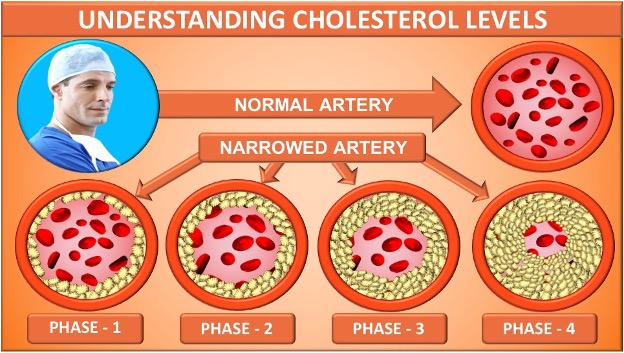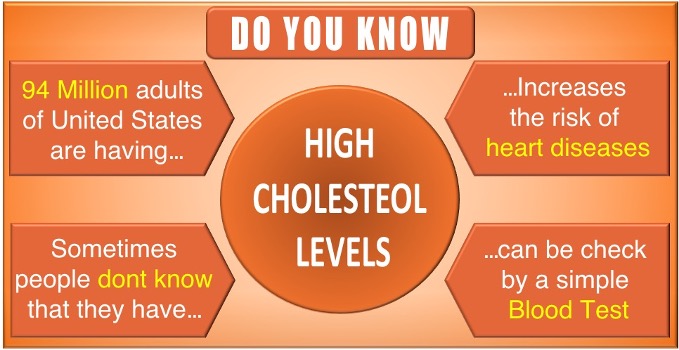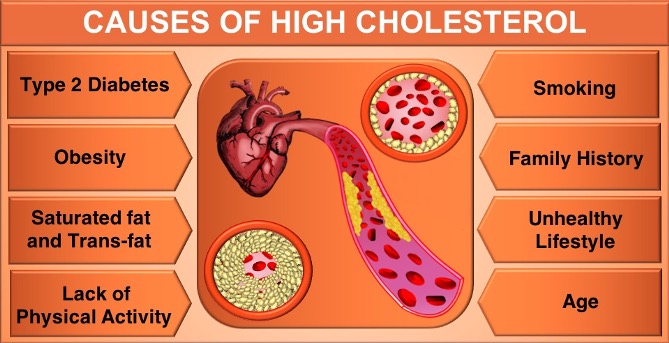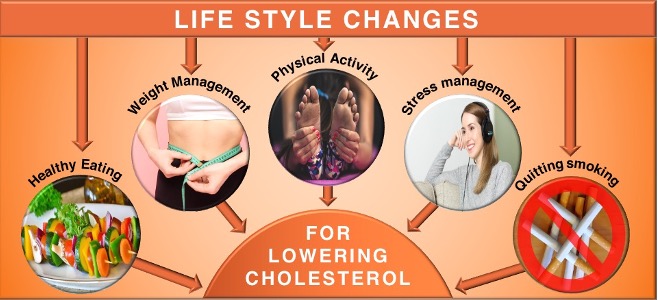Actually Cholesterol levels may vary by the age, weight, and sex. That’s why Understanding Cholesterol Levels is must for the people over 20 years of age. Before going to the question “What are Normal Levels for Cholesterol.” We must understand “what is cholesterol” and why doctors recommend everyone above 20 years should check their cholesterol levels regularly.
Understanding Cholesterol Levels

Here are some facts. Do you know?
The CDC (Canters for Disease Control and Prevention) estimates that close to 94 Million adults of United States are having high cholesterol problem.
Having high blood cholesterol level increases the risk of heart diseases, it is the leading cause of death.
Sometimes high cholesterol level has no symptoms. That’s why many people do not know that their cholesterol level is too high.
You can check your cholesterol levels by a simple blood test.
Understanding Cholesterol Levels Results in US

People, who have who have a family history of high cholesterol, heart disease or diabetes need to get their cholesterol checked frequently.
Typically male’s blood cholesterol levels increase by the age, and a female’s cholesterol levels tend to rise after menopause.
What is Cholesterol?
Blood cholesterol is a fat-like waxy substance. It is a lipid made by your liver, but you can also consume it by eating animal foods including meat, seafood, poultry, eggs, and dairy products.
Actually blood cholesterol is essential for your good health. Your body needs it to perform important jobs, like producing hormones, producing Vitamin D, digesting fatty foods, and help form cell membrane layers.
The fact you must know – your body makes all the blood cholesterol it needs.
Then why to worry about blood cholesterol levels? To answer this you need to know some Myths and Facts about Cholesterol Levels.
Myths and Facts About Cholesterol that you should know
Understanding Cholesterol Levels is must because sometimes cholesterol levels can be confusing for you. So you need to learn answers to the common questions about blood cholesterol.
Myth: All type of cholesterol are bad for you.
Fact: No. Blood cholesterol is essential for your body to function properly, and your body itself makes all the blood cholesterol it needs. Low Density Lipoprotein (LDL) which is major part of blood cholesterol is also known as Bad Cholesterol and High Density Lipoprotein is known as Good Cholesterol
Myth: I would feel it if I have high blood cholesterol levels.
Fact: High cholesterol levels generally has no symptoms. You may not know that you have high bad cholesterol levels until it is too late. You might come to know once you have a heart attack or stroke.
Myth: I cannot change my cholesterol levels.
Fact: There are many ways you can improve your cholesterol levels and keep them always in a healthy range.
Myth: I can manage my cholesterol with diet and exercise and I don’t need medicine.
Fact: Many people can manage good cholesterol levels by healthy food choices and by doing enough exercises, but some people with cardiovascular disease, Diabetes and genetic condition of high LDL (bad cholesterol) may also need medicines.
HDL Cholesterol vs LDL Cholesterol - Understanding Blood Cholesterol
By now you know which cholesterol is good ldl or hdl, but there is more you should know about it. In your body cholesterol travels through the blood on two types of lipoproteins. First is “LDL” means “Low-density Lipoprotein” which makes up most of your body’s Cholesterol, sometimes known as Bad Cholesterol. High levels of LDL (bad cholesterol) raise your risk for stroke and heart disease.
LDL is called “bad cholesterol” because it brings cholesterol to your arteries, and large amount of cholesterol in your arteries lead to build up on the walls of your blood vessels. This build up is known as “plaque.” As your blood vessels builds up these plaque with the time, the insides of the blood vessels become narrow. This narrowing inside blood vessels blocks blood flow to and from your heart and other body parts. When blood flow to the heart is blocked, it causes angina (chest pain) or a Heart Attack.
The second is “HDL” means “High-density Lipoprotein” sometimes known as good Cholesterol because it absorbs cholesterol and carries it back to the liver. Then the liver flushes it out of the body. High levels of HDL cholesterol lowers your risk for stroke and heart disease.
LDL and Total cholesterol levels must be low, but having more good cholesterol (HDL) in the blood reduces the risk of stroke or heart attack.
Doctors can measure HDL, LDL, and total cholesterol levels with a simple blood test called “Lipid Profile Test”.
Blood Cholesterol Test also known as Lipid Profile Test
Usually high cholesterol level has no signs or symptoms. The only way to find whether you have high cholesterol is to do a simple blood test, called “lipid profile,”. This test measure your blood cholesterol levels.
When Should you get your blood cholesterol levels checked
If You are a healthy adult then should have your cholesterol checked every 4 to 6 years.
If you have heart disease or diabetes or you have a family history of high cholesterol, then you need to get their cholesterol checked more often.
If you have kids or younger family members then you should have their cholesterol levels checked once between age 9 to 11 and again at age 17 to 21.
You need to fast for 8 to 12 hours (not eat or drink) before your lipid profile/cholesterol test.
The Lipid Profile or cholesterol test checks levels of:
- Bad cholesterol or LDL (Low-density lipoprotein). High levels of LDL can lead to building up plaque in your arteries.
- Good cholesterol or HDL (High-density lipoprotein). High levels of HDL can lower your risk of heart diseases and stroke.
- Triglycerides. It’s a Non-HDL – Total cholesterol minus your HDL is your Non HDL, it includes LDL and other types of cholesterol such as VLDL (very-low-density lipoprotein).
- Type of fats in blood that body uses for energy. High levels of triglycerides with low HDL or high LDL cholesterol levels may increase risk for heart attack and stroke.
- Total cholesterol. Total amount of cholesterol based on HDL, LDL, and triglycerides numbers.
What are normal levels of cholesterol
Generally cholesterol levels increase with age. By taking steps to maintain healthy Cholesterol levels earlier in life you can prevent them from getting dangerously high over the time. Long-time unmanaged blood cholesterol levels becomes very difficult to treat.
Cholesterol levels in your blood are measured in “milligrams per decilitre” (mg/dL). Here you can learn about healthy levels of cholesterol, based on your age and gender your Doctor will suggest what is good level of cholesterol for you.
Table : Normal Leveles Of Cholesterol

Triglycerides are not cholesterol but they are part of the test that measures cholesterol levels. An optimal triglyceride level is below 150 mg/dL. You need treatment if your triglyceride levels are borderline high (150-199 mg/dL) or high (200 mg/dL or more).
Understanding Cholesterol Levels - Cholesterol levels for adults chart
Cholesterol readings are important, but they doesn’t give complete idea about your overall health. Along with cholesterol levels your doctor will look at your family history, gender, age, and your lifestyle such as smoking. The overall picture helps your doctor to determine what steps you need to take to lower your risk for heart disease and stroke.

Chart for high Cholesterol levels in Children (Understanding Cholesterol Levels for Childeren)
If your child has high cholesterol in the blood, he or she has a higher risk of coronary Artery diseases and other heart diseases. Here, this table bellow will help you understanding cholesterol levels.

What causes high cholesterol in children?
There are Three main factors that contribute to high cholesterol in children.
- An unhealthy especially high in fats diet.
- Family history of high cholesterol problem, when one or both the parents have high cholesterol and
- Obecity and Some diseases, such as diabetes, certain thyroid diseases and kidney disease, can also cause high cholesterol in children and teens.
What causes high cholesterol foods, Lifestyle, family History or Medical condition?
Some health issues, lifestyle and family history can be reason for high cholesterol levels. You can consider them as “risk factors.”
- Type 2 diabetes lowers good Cholesterol and raises bad cholesterol levels. This combination increases risk of heart disease and stroke.
- Obesity is directly linked to higher triglyceride levels, higher bad cholesterol levels, and lower Good cholesterol levels. This combination also raises risk of heart disease and stroke.
- Taking saturated fat and trans-fat in diet may contribute to high cholesterol and related conditions, such as heart disease.
- Lack of enough physical activity is main reason of gaining weight, which can lead to high cholesterol.

- Smoking is very dangerous, it damages your blood vessels and they become more likely to collect fatty deposits. Smoking can also lower HDL, or “good cholesterol” levels. If you don’t smoke, don’t start.
- If high cholesterol is in your family history then you also more likely to have high cholesterol issue. In that case you need to get your cholesterol levels checked more often.
- The risk increases even more with combination of high cholesterol family history with unhealthy lifestyle choices, such as unhealthy diet and eating.
- The risk for high cholesterol increases with age. As we grow older our bodies cannot clear cholesterol from the blood as it could when we were younger. It leads to higher blood cholesterol levels, with the risk of stroke and heart disease.
How do I lower my cholesterol
Mainly there are two ways to lower your blood cholesterol levels.
1. Life style Changes:
This Includes heart-healthy mental, physical and diet planning.
Heart Healthy Eating :
Heart Healthy diet plan reduces intake of saturated and trans fat that you eat.
Weight Management :
If you are overweight, losing weight till required limit can help lower your bad cholesterol (LDL)

Regular Physical Activity :
Everyone should develop habit of regular physical activity on daily basis.
Managing stress :
Studies show that chronic stress can raise your LDL (Bad cholesterol) and lower your HDL (Good cholesterol.) So managing stress level can help in keeping cholesterol levels in control.
Quitting smoking :
Quitting smoking can Improve your HDL cholesterol level. Since HDL (Good Cholesterol) helps to remove LDL (Bad cholesterol) from your arteries, having more HDL may help to lower your LDL cholesterol level.
2. Drug Treatment :
If lifestyle changes alone are not able to lower your cholesterol enough, Then you need to take medicines. These medicines work in various ways and may have different side effects also. Consult your health care provider to know which one is suitable for you. While you are taking medicines to lower your cholesterol, you must continue with the heart-healthy lifestyle changes.


